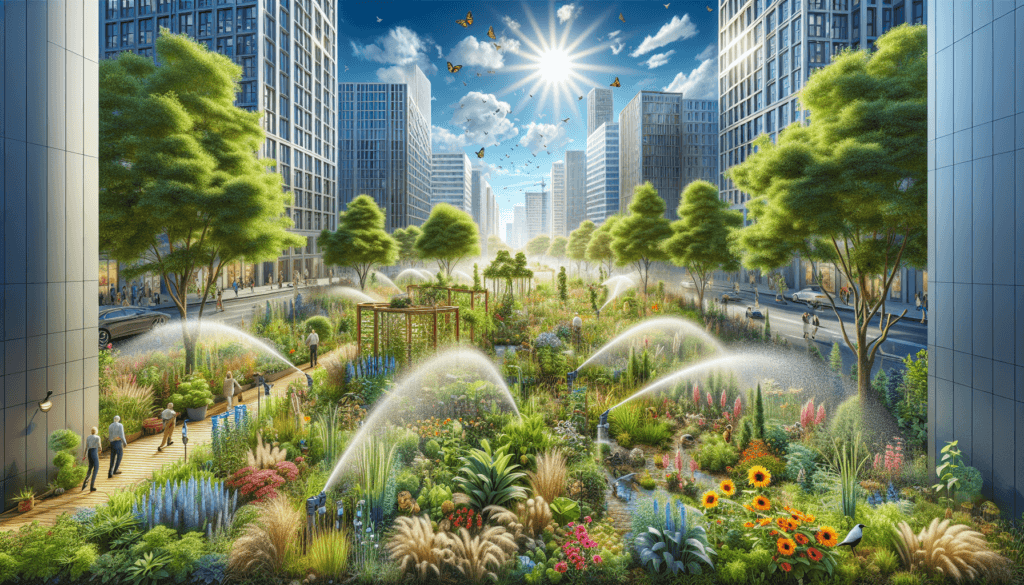Urban gardening is not just a trendy hobby; it is a powerful tool in taking care of our environment. By utilizing even the smallest spaces in cities, such as balconies or rooftops, urban gardening offers numerous benefits that contribute towards a greener and more sustainable future. From reducing air pollution to conserving water and promoting biodiversity, the practice of urban gardening offers a myriad of positive impacts that not only benefit individuals but also create a healthier and more vibrant urban ecosystem. Urban gardening has gained popularity in recent years as people become more conscious of their impact on the environment. By growing plants in urban areas, you can make a positive contribution to reducing your carbon footprint and improving the environment. In this article, we will explore the various environmental benefits of urban gardening and how it can make a difference.

Reduced Carbon Footprint
Decrease in Food Transportation Emissions
Urban gardening allows you to grow your own food locally, which greatly reduces the need for long-distance transportation. When you cultivate your own fruits, vegetables, and herbs in your backyard or on your balcony, you eliminate the emissions associated with transporting produce from farms to stores. This reduction in food transportation emissions helps lower your carbon footprint and contributes to a cleaner environment.
Lowered Energy Consumption
Another environmental benefit of urban gardening is the reduced energy consumption compared to commercially grown produce. Large-scale agricultural practices often require excessive amounts of energy for irrigation, fertilizers, and transportation. By growing your own food, you bypass these energy-intensive processes, leading to significant energy savings. This lower energy consumption helps conserve natural resources and reduces greenhouse gas emissions.
Offset of Carbon Dioxide Emissions
Plants play a crucial role in offsetting carbon dioxide emissions. Through a process called photosynthesis, plants absorb carbon dioxide from the atmosphere and convert it into oxygen. With urban gardening, you can increase the number of plants in your surroundings, enhancing the carbon dioxide absorption capacity of your neighborhood. By actively participating in urban gardening, you contribute to mitigating the adverse effects of climate change and reduce your carbon footprint.
Improved Air Quality
Absorption of Carbon Dioxide
As mentioned earlier, plants absorb carbon dioxide during photosynthesis. By incorporating plants into urban environments through gardening, you create natural filters that trap and remove carbon dioxide from the air. This process not only helps improve air quality but also aids in combating global warming and climate change.
Filtering of Air Pollutants
Urban areas often suffer from high levels of air pollution, primarily caused by vehicle emissions, industrial activities, and other human-related factors. However, urban gardening can play a vital role in filtering out these air pollutants. Plants have the ability to absorb and break down harmful substances, such as particulate matter and volatile organic compounds. By gardening in urban spaces, you can help cleanse the air and create a healthier living environment for yourself and your community.
Release of Oxygen
In addition to absorbing carbon dioxide and filtering air pollutants, plants release oxygen during the process of photosynthesis. By increasing the number of plants through urban gardening, you contribute to the oxygen supply in your surroundings. This infusion of oxygen into the air not only improves air quality but also creates a refreshing and revitalizing atmosphere for everyone to enjoy.

Reduced Urban Heat Island Effect
Shading and Evapotranspiration
Urban areas are known for their excessive heat, often causing what is known as the urban heat island effect. This phenomenon occurs due to the higher concentration of buildings and concrete surfaces, which absorb and radiate heat. However, urban gardening can help mitigate the heat island effect through shading and evapotranspiration. Trees, plants, and green spaces provide shade, reducing the amount of direct sunlight that hits the ground and buildings. Additionally, plants release water vapor through their leaves, a process known as evapotranspiration, which cools the surrounding air.
Cooling Effects
The presence of plants in urban areas can significantly lower temperatures by creating a cooling effect. The shade provided by trees and green spaces helps reduce surface and air temperatures, making cities more comfortable during hot summer months. By incorporating urban gardening into your surroundings, you contribute to the overall cooling of your neighborhood, making it a more pleasant place to live and reducing the need for excessive air conditioning.
Mitigation of Heat Stress
The urban heat island effect can have detrimental effects on human health, particularly for vulnerable populations such as the elderly and those with respiratory conditions. By implementing urban gardening initiatives, we can mitigate heat stress and create a safer environment for everyone. The cooling effects of plants and green spaces help alleviate the intensity of heat waves, reducing the risk of heat-related illnesses. Urban gardening, therefore, promotes a healthier and more livable urban environment.
Conservation of Biodiversity
Creation of Habitats
Urban gardening provides an opportunity to create habitats for various species, including birds, insects, and small mammals. By growing a diverse range of plants, you attract different organisms, contributing to the conservation of urban biodiversity. These habitats serve as valuable ecosystems within cities and help support the overall health and balance of local wildlife populations.
Promotion of Pollinators
Many plant species rely on pollinators, such as bees, butterflies, and birds, for reproduction. Urban gardening can act as a crucial resource for these pollinators by providing them with a diverse range of nectar-rich flowers and plants. As pollinators visit your garden in search of food, they contribute to the pollination of surrounding vegetation, including nearby trees and flowering plants. By promoting pollinators through urban gardening, you indirectly enhance biodiversity and the resilience of urban ecosystems.
Preservation of Native Species
Urban areas often face challenges related to invasive plant species that outcompete and displace native plants. Through urban gardening, you have the opportunity to promote the growth of native plant species, which in turn supports native wildlife populations. By cultivating native plants, you contribute to the preservation of local biodiversity and create a more sustainable urban environment.

Water Management
Stormwater Runoff Reduction
Urban areas are prone to excessive stormwater runoff due to the impermeable surfaces such as concrete and asphalt. This runoff can lead to flooding and the contamination of water bodies with pollutants. However, urban gardening can help reduce stormwater runoff by absorbing and retaining rainwater. The presence of plants and soil in gardens allows for better water infiltration, minimizing the strain on urban drainage systems and helping prevent floods.
Water Infiltration and Retention
The soil in urban gardens acts as a sponge, absorbing and retaining moisture. Through proper irrigation and gardening practices, you can enhance water infiltration and retention, creating a more efficient water management system. By effectively utilizing water resources and minimizing water waste, urban gardening contributes to sustainable water use and conservation.
Natural Flood Control
In addition to reducing stormwater runoff, urban gardens can serve as natural flood control systems. The vegetation and soil in gardens help slow down the flow of water, allowing it to be absorbed and retained rather than rapidly flowing into drainage systems. By incorporating gardens into urban landscapes, we can create natural buffers that protect communities from flooding and water-related disasters.
Improved Soil Quality
Enhanced Soil Structure
Urban areas often suffer from poor soil quality due to construction, pollution, and other human activities. However, urban gardening can help improve soil structure by adding organic matter and promoting the growth of beneficial microorganisms. By cultivating plants and practicing composting, you can enhance soil fertility and create healthier soils for future gardening endeavors.
Increased Organic Matter Content
Organic matter is crucial for maintaining healthy soils. By incorporating organic materials, such as compost and mulch, into your urban garden, you increase the organic matter content of the soil. This organic matter provides essential nutrients to plants, improves soil structure, and enhances moisture retention. Through urban gardening, you contribute to the creation of nutrient-rich soils and support sustainable gardening practices.
Prevention of Soil Erosion
Soil erosion is a common problem in urban areas, especially during heavy rainfall events. However, urban gardening can help prevent soil erosion by anchoring the soil with plants and their root systems. The roots bind the soil particles together, reducing the risk of soil erosion caused by water or wind. By gardening in urban spaces, you contribute to soil conservation and the prevention of soil degradation.

Noise Reduction
Planting of Trees and Shrubs
Noise pollution is a significant issue in urban areas, affecting the health and well-being of residents. However, urban gardening can help reduce noise levels by planting trees and shrubs that act as natural sound barriers. The presence of vegetation helps buffer sound waves, absorbing and deflecting noise, creating a quieter and more peaceful environment for both humans and wildlife.
Buffering of Sound Waves
The leaves, branches, and trunks of plants provide a physical barrier that acts as a buffer for sound waves. By strategically planting trees and shrubs near busy streets or noisy areas, you can significantly reduce the impact of noise pollution on your surroundings. Urban gardening offers an effective and natural solution for mitigating noise disturbances and creating more serene living spaces.
Creation of Peaceful Environments
The calming and relaxing effect of green spaces is well-known, providing a haven from the hustle and bustle of urban life. By incorporating urban gardens into your surroundings, you create peaceful environments where residents can escape the noise and stress of the city. These tranquil spaces offer mental respite and enhance overall well-being, contributing to a healthier and happier community.
Energy Conservation
Shade Provision and Temperature Regulation
One of the environmental benefits of urban gardening is the energy conservation it offers. By strategically planting trees and vegetation, you can provide shade to buildings and outdoor areas, reducing the need for artificial cooling systems. Through natural temperature regulation, urban gardens help conserve energy and reduce the reliance on air conditioning, ultimately reducing greenhouse gas emissions.
Reduced Energy Needs for Cooling
The shade provided by trees and plants in urban gardens helps keep buildings and outdoor spaces cooler, effectively reducing the energy needs for cooling. By utilizing natural shade, you can significantly cut down on the usage of air conditioners and other cooling devices. This reduction in energy consumption not only lowers greenhouse gas emissions but also contributes to significant energy savings.
Mitigation of Urban Heat
Urban areas often experience elevated temperatures due to the urban heat island effect and insufficient green spaces. However, urban gardening can help mitigate urban heat by providing natural cooling through evapotranspiration and shading. By incorporating green spaces within urban landscapes, you contribute to the overall cooling of your community, making it more comfortable and livable for everyone.

Waste Reduction
Composting of Organic Waste
Urban gardening promotes waste reduction through the practice of composting organic waste. By composting fruit and vegetable scraps, yard trimmings, and other biodegradable materials, you divert waste from landfills and create nutrient-rich compost for your plants. Composting not only reduces greenhouse gas emissions that would otherwise occur in landfills but also helps enrich the soil, promoting healthy plant growth.
Decreased Production of Packaging
Commercially grown food often comes packaged in plastic and other non-biodegradable materials, contributing to waste accumulation and environmental pollution. However, by growing your own food through urban gardening, you eliminate the need for excessive packaging. Freshly harvested vegetables and fruits can go straight from the garden to your plate, significantly reducing waste in the form of packaging materials.
Minimization of Food Waste
Food waste is a significant environmental issue worldwide, with large amounts of food ending up in landfills. However, urban gardening encourages the production of only what is needed, reducing the chances of food waste. By growing your own food, you have better control over harvesting only the quantities required, minimizing food waste and contributing to a more sustainable food system.
Community Building
Encouraging Social Interactions
Urban gardens can act as community spaces, bringing people together and fostering social interactions. By participating in urban gardening initiatives or joining community gardens, you have the opportunity to meet like-minded individuals and build relationships. Gardening activities and shared spaces create a sense of community and provide opportunities for collaboration, education, and the exchange of gardening knowledge.
Promotion of Mental Well-being
Interacting with nature has been proven to have positive effects on mental health and well-being. Urban gardening offers a chance to connect with nature in an urban environment, providing a much-needed respite from the stress of daily life. By spending time in urban gardens, you can enjoy the therapeutic benefits of gardening, reduce anxiety, and improve overall mental well-being.
Enhanced Sense of Belonging
Engaging in urban gardening activities fosters a sense of belonging and connection to your community. By actively participating in gardening initiatives, you contribute to the overall well-being of your neighborhood and create a shared sense of pride. The shared responsibility of caring for urban gardens creates a stronger sense of belonging and ownership, ultimately leading to a more vibrant and cohesive community.
In conclusion, urban gardening offers numerous environmental benefits that contribute to a more sustainable and eco-friendly urban environment. Through reduced carbon footprint, improved air quality, mitigated urban heat island effect, conservation of biodiversity, effective water management, improved soil quality, noise reduction, energy conservation, waste reduction, and community building, urban gardening has the power to make a significant positive impact on our surroundings. So grab your gardening tools and seeds, and start making a difference in your community by embracing urban gardening today!

